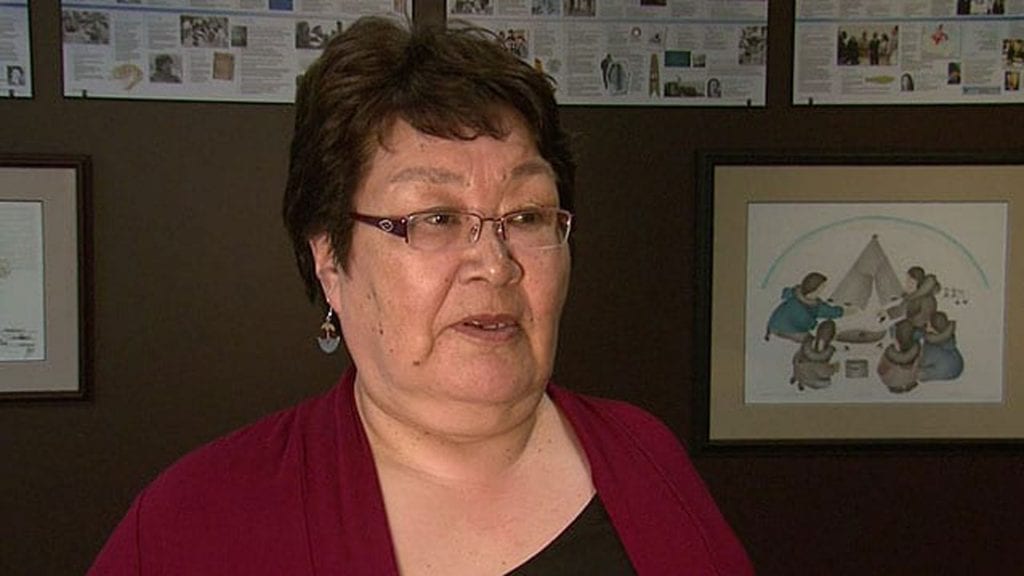
Pauktuutit President Rebecca Kudloo in 2017. Photo: APTN
Ottawa has fulfilled a promise to fund the construction and operation of five new emergency shelters – four in the North and one in Ottawa – for Inuit women and children seeking a safe haven from domestic violence and abuse.
Pauktuutit Inuit Women of Canada, which lobbied federal cabinet ministers for the shelters last year, hailed the announcement as a “concrete action toward meaningful reconciliation with Inuit women and children.”
“They made good on their words and delivered,” said Rebecca Kudloo, president of the national advocacy organization, in a statement Wednesday. “This announcement addresses a glaring funding gap that has existed for many decades for Inuit women.”
The shelters will cost $20 million to build, according to Pauktuutit’s estimate. They propose to build one shelter in each of the four regions of Inuit Nunangat and the other shelter in the nation’s capital, a city where thousands of Inuit live.
“This funding is a down payment on the investments that must be forthcoming to respect the human rights of Inuit women, including the right to safety and security of their person,” added Kudloo.
Pauktuutit said Ottawa also guaranteed long-term operational funding which would ensure the shelters can deliver services for years to come.
Indigenous Services Canada said the cash will flow from the $724-million pool earmarked during the 2020 fall economic statement for a comprehensive violence prevention strategy.
“Inuit women and children face heightened challenges when seeking refuge from domestic violence and abuse,” said the department in a Tuesday evening release.
“The COVID-19 pandemic has only exacerbated this already dire situation, where some women are concerned about domestic violence during the pandemic than they are about the virus.”
The statement said Indigenous Services, Pauktuutit and the Canadian Mortgage and Housing Corporation will collaborate to determine the exact locations and further refine the details of the projects.
“I recognize that the longer the pandemic drags on and the stricter the lockdown becomes, the more dangerous the situation is for women and children at risk,” said Minister Marc Miller during a press conference on Wednesday.
He said the five Inuit-specific shelters will be built in addition to 12 new shelters – 10 for First Nations and two for the territories – that Ottawa promised to fund last spring.
“Throughout this pandemic people have been pushed past their limits,” said Miller. “Our society has been going through a harrowing ordeal, and we have much to learn from Indigenous communities, who have been resilient throughout all the injustices they’ve endured.”
Read More:
Pauktuutit urges Trudeau to reconsider shelter plan for Inuit women
The population of Inuit Nunangat experiences the highest rate of violence in the country, yet, according to government figures, over 70 per cent of Inuit communities don’t have access to emergency shelters.
Inuit women experience violence at 14 times the national average, higher than any other group of women in Canada, Pauktuutit said in a report released a year ago.
The report was called Addressing Gendered Violence against Inuit Women: A review of police policies and practices in Inuit Nunangat.
It called for a “fundamental shift” in the way police in Inuit territory do their jobs.
It delivered several recommendations to create a decolonized, culturally competent and trauma informed policing regime.
Also on Wednesday, Pauktuutit and the RCMP signed a co-operation agreement with hopes of implementing those recommendations and improving policing.
“Systemic racism is a reality in Inuit women’s encounters with the police,” said Kudloo in a different release. “Women experiencing domestic violence often feel further victimized when they come into contact with police, after having the courage to report incidents of abuse.”
The Mounties call the new collaboration agreement, called the Pinasuqatigiinniq Agreement, a step forward.
“It is important that the RCMP acknowledges and learns from the past, evaluates our current actions, and collaborates with Indigenous communities, peoples and employees for the future,” said Commissioner Brenda Lucki in a press release.
The organizations committed to hold formal teleconferences between leadership twice per year and hold regular teleconferences with commanding officers as required.
They agreed to jointly develop an “evergreen workplan” that will be signed annually and include a status update from the previous year.









